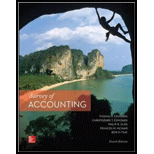
Concept explainers
a.
Identify the events whether it result in revenue or expense recognition.
a.
Explanation of Solution
Revenue recognition principle:
Revenue recognition principle states that every business organization should recognize the revenue when it is earned, no matter, cash related to that obligation is received or not.
Expense recognition principle:
According to this principle, the expense should be recognized when it is actually incurred, doesn’t matter, payment is made or not.
Identify the events whether it is revenue or expense recognition:
| Event | Revenue | Expense |
| 1. Issued common stock | NA | NA |
| 2. Performed service on account | $67,000 | NA |
| 3. Paid Cash dividends | NA | NA |
| 4. Collected accounts receivable | NA | NA |
| 5. Payment made for operating expenses | NA | $49,000 |
| 6. Performed services for cash | $10,000 | NA |
| 7. Recognized accrued utilities expense | NA | $2,000 |
Table (1)
b.
Determine the amount of net income that is reported on the income statement for the year 2014.
b.
Explanation of Solution
Income statement: Income statement is a financial statement that shows the net income or net loss by deducting the expenses from the revenues and vice versa.
Prepare the income statement to compute the net income:
| Incorporation V | |
| Income statement | |
| Particulars | Amount ($) |
| Total Revenue (1) | $77,000 |
| Less: Total Expenses (2) | $51,000 |
| Net income | $26,000 |
Table (2)
Working note 1: Calculate the amount of total revenue:
Working note 2: Calculate the amount of total expenses:
Hence, the amount of net income that is to be reported on the income statement for the year 2014 is $26,000.
c.
Identify the events that affect the statement of
c.
Explanation of Solution
Cash Flow Statement:
Cash Flow Statement is a fundamental financial statement that renders valuable information regarding the
Identify the events that affect the statement of cash flows.
| Event | Statement of cash flows | Amount |
| 1. Issued common stock | FA | $50,000 |
| 2. Performed service on account | NA | NA |
| 3. Paid Cash dividends | FA | ($50,000) |
| 4. Collected accounts receivable | OA | $45,000 |
| 5. Payment made for operating expenses | OA | ($49,000) |
| 6. Performed services for cash | OA | $10,000 |
| 7. Recognized accrued utilities expense | NA | NA |
Table (3)
Operating activities: Operating activities include cash inflows and outflows from business operations.
Investing activities: Investing activities includes cash inflows and cash outflows from purchase and sale of land or equipment, or investments.
Financing activities: Financing activities includes cash inflows and outflows from issuance of common stock and debt, payment of debt and dividends.
Note:
FA refers to Financing Activity.
OA refers to Operating Activity.
NA refers to not affected by the event.
d.
Determine the amount of cash flow from operating activities that is to be reported on the cash flow statement for the year 2014.
d.
Explanation of Solution
Cash Flow Statement:
Cash Flow Statement is a fundamental financial statement that renders valuable information regarding the cash inflows or the cash receipts of a business and the cash outflows or cash payments for a specific period of time.
Cash flows from operating activities refer to the cash received or cash paid in day-to-day operating activities of a company.
Prepare the statement of cash flow to calculate the cash flow from operating activities.
| Incorporation V | |
| Cash flow statement | |
| Particulars | Amount ($) |
| Cash flow from operating activities | |
| Cash from revenue (3) | $55,000 |
| Cash paid for expenses | ($49,000) |
| Net cash flow from operating activities | $6,000 |
Table (4)
Working note 3: Calculate the amount of cash from revenue:
e.
Identify the balance of the service revenue account before and after closing.
e.
Explanation of Solution
The amount of service revenue before closing the revenue account is $77,000.
The amount of service revenue after closed to the
f.
Identify the balance of retained earnings account that appears on the
f.
Explanation of Solution
Retained earnings:
Retained earnings are the portion of earnings kept by the business for the purpose of reinvestments, payment of debts, or for future growth.
Prepare the retained earnings statement to calculate the balance of retained earnings.
| Incorporation V | |
| Statement of Retained Earnings | |
| Particulars | Amount ($) |
| Retained earnings, Beginning | $0 |
| Add: Net income | $26,000 |
| $26,000 | |
| Less: Dividends | ($5,000) |
| Retained earnings, Ending | $21,000 |
Table (5)
Hence, the balance of retained earnings that appears on the balance sheet as of 2014 is $21,000.
Want to see more full solutions like this?
Chapter 2 Solutions
Survey Of Accounting

 AccountingAccountingISBN:9781337272094Author:WARREN, Carl S., Reeve, James M., Duchac, Jonathan E.Publisher:Cengage Learning,
AccountingAccountingISBN:9781337272094Author:WARREN, Carl S., Reeve, James M., Duchac, Jonathan E.Publisher:Cengage Learning, Accounting Information SystemsAccountingISBN:9781337619202Author:Hall, James A.Publisher:Cengage Learning,
Accounting Information SystemsAccountingISBN:9781337619202Author:Hall, James A.Publisher:Cengage Learning, Horngren's Cost Accounting: A Managerial Emphasis...AccountingISBN:9780134475585Author:Srikant M. Datar, Madhav V. RajanPublisher:PEARSON
Horngren's Cost Accounting: A Managerial Emphasis...AccountingISBN:9780134475585Author:Srikant M. Datar, Madhav V. RajanPublisher:PEARSON Intermediate AccountingAccountingISBN:9781259722660Author:J. David Spiceland, Mark W. Nelson, Wayne M ThomasPublisher:McGraw-Hill Education
Intermediate AccountingAccountingISBN:9781259722660Author:J. David Spiceland, Mark W. Nelson, Wayne M ThomasPublisher:McGraw-Hill Education Financial and Managerial AccountingAccountingISBN:9781259726705Author:John J Wild, Ken W. Shaw, Barbara Chiappetta Fundamental Accounting PrinciplesPublisher:McGraw-Hill Education
Financial and Managerial AccountingAccountingISBN:9781259726705Author:John J Wild, Ken W. Shaw, Barbara Chiappetta Fundamental Accounting PrinciplesPublisher:McGraw-Hill Education





